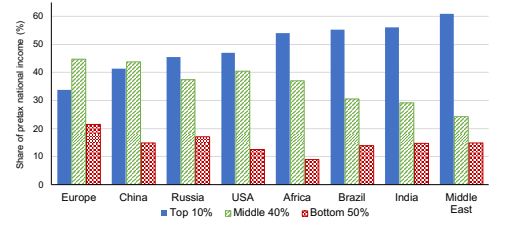The Next Wave: Income Inequality Concerns

A Global Outlook at Inequality
The poorest half of the global population owns just 2% of the global total, while the richest 10% own 76% of all wealth. According to the UN, the average income of people living in North America is 16 times higher than that of people in sub-Saharan Africa. As at 2018, the richest 1% is twice as wealthy as the poorest 50%. This 50% is also made up of the poorest 90% income groups in the EU and the United States who are regarded as ‘middle class’ income earners. The global income inequality appears damning. Although there have been improvements in recent years, it has come from emerging Asian economies like China.
Income inequality concerns have stemmed largely from unequal capital ownership, which can be private or public. While national wealth has increased significantly, public wealth in rich countries is now negative or close to zero. This has important implications for wealth inequality among individuals, and increases income inequality concerns.

Source: World Inequality Lab, 2017
The 2668 billionaire on Forbes’ 2022 World billionaires list have a collective net worth of $12.7 trillion. With the World’s population at about 8,000,000,000, 2668 billionaires account for just 0.00003335% of the global population. The global wealth stands at $272 trillion. This means 0.00003335% of the world accounts for 0.04669% of global wealth.
According to World Inequality report, the top 1% captured 38% of all additional wealth accumulated since the mid-1990s, whereas the bottom 50% captured just 2% of it. This is damning. It appears like nothing has been done to reduce extreme poverty in the world in 30 years.
Nastier African Reality
GDP growth is an important economic parameter; it is a necessity for poorer countries. However, it is not always a sufficient tool to measure growth. It neglects important facet of economy like poverty reduction and inequality reduction. Inequality is a potentially important factor in determining how quickly and effectively growth reduces poverty. Since the global economic crisis of the late 2000s, there appears to have been a renewed interest in the role of inequality and efforts to reduce it in the development discourse.
Discussing how unequal Africa is, becomes alarming when you realize that the region has the highest gap. In Africa, income inequality concerns vary from 13 to 15 in Nigeria, Ethiopia, Guinea and Mali, for instance, to between 40 and 63 in the Central African Republic, Namibia, Zambia and South Africa. For clarity, South Africa has the highest rate of inequality at 63%. Botswana, Mozambique, Eswatini, Central African Republic, Sao Tome and Principe, Zambia, Suriname Namibia and South Africa all made the top 10 unequal countries in world.
South Africa’s income inequality has widened over time, although it’s Africa’s most developed economy. The richest 1% of the population hold nearly 20% of the national income, while the top 10% keep 65%. That is to say 90% of South Africa’s population earn only 35% of all earnings.
In a study by Oxfam in 2017, it was reported that Nigeria’s wealthiest people, including Africa’s richest man, Aliko Dangote, have a combined wealth of $29.9 billion—more than the country’s entire 2017 budget. About 60% of Nigerians live on less than $1.25 a day, the threshold for absolute poverty. It also reported that Dangote’s wealth is sufficient to lift 2 million people out of poverty for one year.
Income Inequality Concerns and the Next Wave
The consequences of inequality extend far beyond purchasing power. Inequalities will adversely impact on a person’s life expectancy and access to basic services like healthcare and education. These are important areas that should not be neglected as the region prepares for the next wave. Africa will need the most skilled workforce to actively participate in the next wave, they need them in their numbers. Not in the very few that have made the national wealth their own or are enjoying monopoly.
Income inequality becomes a concern as it discourages skill acquisition, stifle economic and social mobility, and stunt human development. This is not good for the next wave. Africans need to exercise all the freedom that comes with financial liberation. They can achieve this with the economy’s income structure looking like a tall mis-structured pyramid with a selected few controlling the money affairs.
